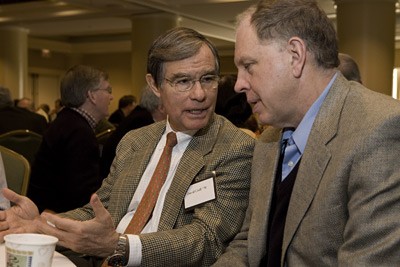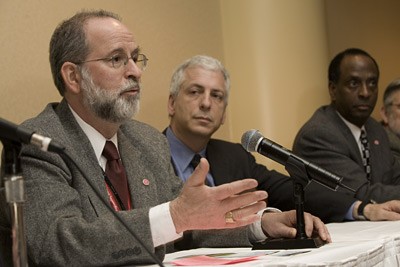Sustainability isn't just about climate change, and answers aren't all in technology, engineering conference concludes
By Bill Steele
Solving the world's energy problems isn't just about research into new technologies, and neither is Cornell research on sustainability, a group of experts told Cornell engineering alumni last week. Alumni responded with such suggestions as seeking support from government and major energy-related industry, working to position Cornell as a world center of sustainability research and possibly creating a major in sustainability.
Sustainability was the theme of the 25th annual conference of the Cornell Engineering Alumni Association, held March 28-29 in Statler Hall.
At a wrap-up session March 29 in the Statler Ballroom, Jeff Tester '66, M.S. '67, the H.P. Meissner Professor of Chemical Engineering at the Massachusetts Institute of Technology — and soon to be the Croll Professor of Sustainable Energy Systems at Cornell — reviewed the worrisome statistics: The United States uses 3.4 terawatts (trillions of watts) of energy but has only 10 percent of the world's oil reserves, for example, and China and India will soon be consuming more energy than we are.
Although climate change has focused public attention on reducing fossil fuel emissions, other equally compelling reasons to move to renewable energy sources, Tester said, include political and economic fallout of the uneven distribution of fossil fuel resources around the world and that those resources will eventually be used up. "It is as much about maintaining our quality of life as about preserving the environment," he said.
Solutions, he said, have to combine new energy technologies with consideration for the environment and economic development. He noted that any technology also must be evaluated over its entire life cycle. Nuclear power, for example, offers immediate pollution-free power, but comes with security concerns and creates long-term disposal problems. He called for the creation of a "National Energy Security Fellowship" to encourage students to enter the field.
Following Tester on the podium, Frank DiSalvo, the John A. Newman Professor of Physical Science and director of the new Cornell Center for a Sustainable Future (CCSF), reiterated Tester's call for a system-oriented approach, noting that more than 300 faculty and at least 30 centers and institutes at Cornell are engaged in energy-related research. Part of CCSF's job, he said, is to connect them, as well as to develop partnerships with industry and government to move basic research into practical outcomes.
Another goal is to increase Cornell's visibility in the field. "Right now, if you Google sustainability, Cornell doesn't come up," he noted.
Among other beginnings, he said, CCSF will award small seed grants to Cornell researchers. He acknowledged support from David Atkinson '60, who has pledged $1 million per year for programs for three years and is considering a future endowment; Paul Sellew '80, who is endowing a graduate fellowship in sustainability; and Mike Zak '75, who has made an unrestricted donation to CCSF for three years. DiSalvo also thanked trustee David Croll '70 for endowing the Croll professorship.
In a following panel discussion, nine experts who had previously appeared as conference speakers debated ways to influence public policy, concluding that the answer was to engage the public and through them, lawmakers.
Media Contact
Get Cornell news delivered right to your inbox.
Subscribe
